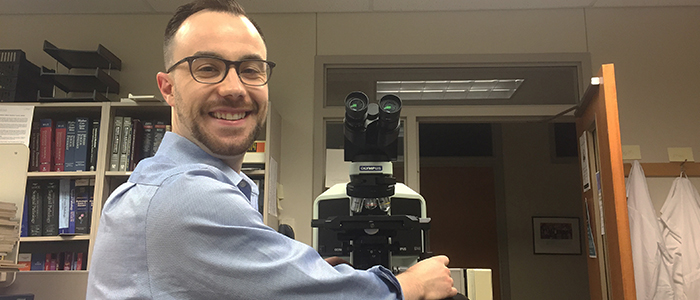Resident spotlight: Dr. Matthew Cecchini, Anatomical Pathology

A graduate of the MD/PhD program at Schulich Medicine & Dentistry, Dr. Matthew Cecchini is now completing his residency training in anatomical pathology. Though Dr. Cecchini doesn’t directly interact with patients, he is motivated to ‘tell the story’ of his patients by carefully examining patient specimens and providing them with the most accurate diagnosis possible.
In this Q&A, Dr. Cecchini discusses the mentors he has had, why he enjoys training alongside the pathologists at London Health Sciences Centre, and his love of Game of Thrones.
Where you were born and raised, and what degrees do you have?
I was born and raised in the small city of Thorold, Ontario, just outside of Niagara Falls. I completed my undergraduate degree in biotechnology from Brock University. After my undergrad, I completed the MD/PhD program at Schulich Medicine & Dentistry, where I studied biochemistry under the supervision of Fred Dick, PhD.
Did you have a role model or mentor who inspired you to follow your academic path? If not, why did you decide to pursue medicine? When did you know that you wanted to pursue your specialty?
I have been very fortunate to have several mentors throughout all stages of my training. In my undergraduate studies at Brock I was inspired by Jeffrey Atkinson, PhD, to pursue a career in research. In my PhD studies and beyond Fred Dick at Schulich Medicine & Dentistry has been instrumental in my training and development in research.
I am now very fortunate to be training in anatomical pathology at Schulich Medicine & Dentistry, as it is a unique and special training environment. I feel that I have an entire Department of pathologists that mentor, inspire and guide me on my journey through residency. All the staff pathologists genuinely care and are invested in the training of residents in the department. I am inspired and motivated by their dedication and commitment to their work. I am genuinely thankful for their generosity and interest in resident education, and it is something that I hope to one day pass forward to the next generation of pathology residents.
What has been your most rewarding experience to date in your residency?
In Pathology we do not directly interact with patients, but rather focus on making diagnoses based upon small biopsies or larger resections of tissue. Our patient is the specimen that we have in front of us or the slides that we look at under the microscope. Working with many of the pathologists in the department, they encourage the residents to ‘tell them the story of the patient’. This transforms the specimen from an artificially stained bit of tissue on a glass slide, into a piece of a patient that is someone’s mother, father or child. We are challenged in pathology to make life changing diagnoses of benign or malignant conditions. The stakes are high, and this responsibility is not one that I take lightly. However, it is very rewarding to know that the hard work we put in daily to diagnose specimens will positively impact patients to ensure that they get the best and most accurate diagnosis possible.
What has been the most challenging experience to date in your residency?
Pathology is a large discipline and the amount of information that we need to know is overwhelming at times. Many days it feels that I will never be able to get all the various facts and concepts about disease organized in my mind. However, as I progress through residency, things begin to fit together and it is possible to see and connect how the various aspects of disease fit together.
What learning from your undergraduate medical education or early residency do you return to often now as you are pursuing your residency?
Molecular pathology is becoming a larger part of the pathology practise as new mutations and genetic alterations are identified that influence how we diagnose and treat disease. My background in biochemistry and genetics has provided me with the skills required to understand the complex relationship between genetics, biochemistry and disease.
How do you maintain balance in your life (hobbies, interests, voluntarism, etc…)?
I really enjoy watching good television series. I love trying to guess what is going to happen next. My favourite series right now is The Leftovers, and I can’t wait for Game of Thrones to return this summer. It helps after a long stressful week at work to spend an hour with my wife watching a great television show trying to guess what is going to happen next.
Rapid Round:
If you were to create a slogan for your life, what would it be?
Explore, inquire and question.
What are three albums that give a glimpse of who you are as a person?
I have a very eclectic taste in music. I enjoy alternative/rock music with some of my favourite albums being the Kings of Leon – Because of the times (2007) and Jimmy Eat World - Bleed American (2001). When I am looking at slides I enjoy listening to something more upbeat to energize me and help me focus. I usually just put on the electronic music channel on Apple Music and work away through my cases.
If you could trade lives with one person for an entire day who would it be and why?
George R. R. Martin, for the sole reason of knowing how Game of Thrones will end.
What is the most random thing you’ve ever watched on Netflix?
Robot Wars—it was one of my favourite TV shows as a kid and is centred on contestants who build robots to battle in an arena against one another. It brings back great memories of sitting with my brother and dad cheering on different robots as they battled in the arena. My wife, unfortunately, is less interested in watching robots battle against one another…








